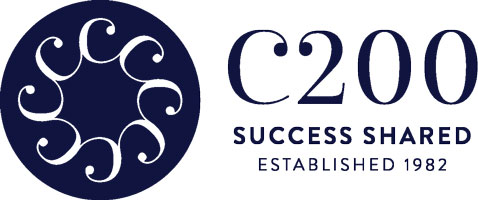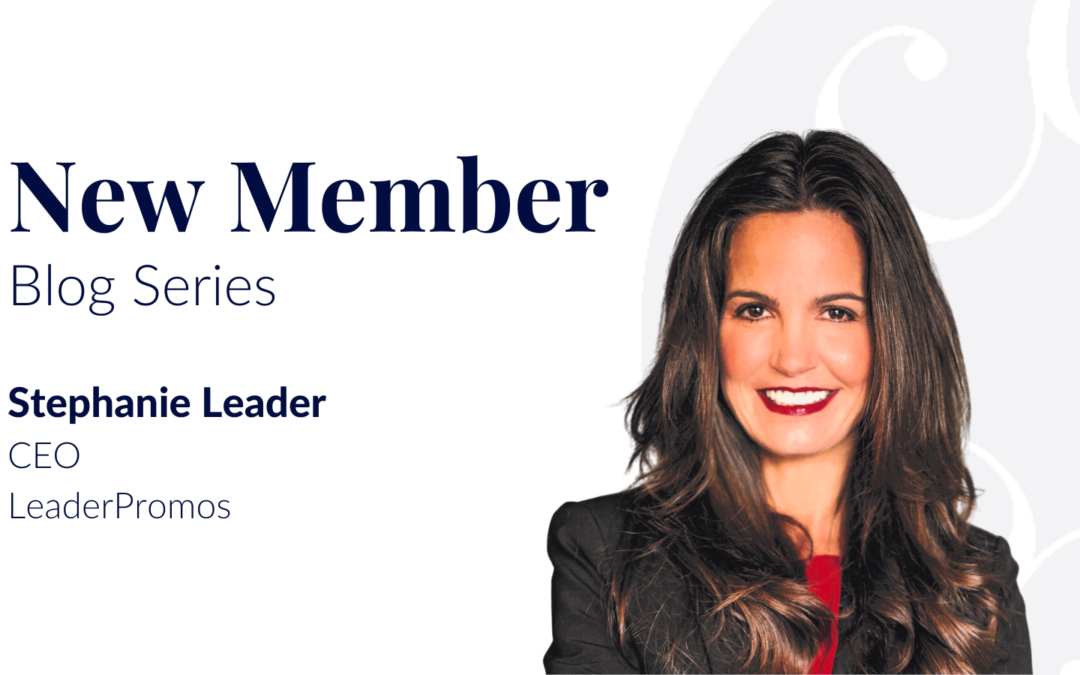
by Eva Glassman | Feb 5, 2024 | Blog, Featured
Stephanie Leader is the CEO and founder of Leader Promotions (dba Leaderpromos), a company that creates and sells purpose-driven branded merchandise and strategically helps their clients deliver their message and reach their goals. With a bachelor’s in political science from The Ohio State University (OSU), Stephanie deferred her admission to law school to become a partner in the company she worked for through college; since then, she has grown and transformed the business into a global corporation, achieving nearly $55 million in revenue in 2023. Outside of work, Stephanie enjoys an active lifestyle and spending time with her family. Stephanie has been a C200 member since November 2023.
Eva Glassman: Can you describe your company and what you do? How did you get started there?
Stephanie Leader: I am the CEO, founder, and visionary of Leader Promotions. We focus on purpose-driven, branded merchandise that delivers results. Our approach within the company is to learn about the initiatives and goals of our clients and provide them with the right merchandise that will best drive their message and give them a good return on their investment. It all starts with asking the right questions.
I started out in this industry when I was 19 years old. To make money and pay my way through school at OSU, I started selling branded merchandise and apparel to the Greek community since OSU had the largest Greek community in North America at the time. I was a political science major and had ambitions to go to law school, but I enjoyed selling merchandise and meeting so many people from different fraternities and sororities.
When I was getting ready to leave for law school in Chicago, my boss at the time asked me if I would consider becoming a partner of the company. My initial reaction was, “Why me?” I realized, once I saw the financials, that I had the highest sales in the company and was leading a lot of our new initiatives already. So, I decided to defer my admission to law school and give this a try. I was supposed to move to Chicago that fall—instead, I became a business owner!
Soon after I became a partner in 1995, my partner got sick with Celiac Disease and left the business. So, there I was with this company, thinking, “Oh my gosh, what am I doing?” The reality quickly set in that I didn’t know anything about running a business. I didn’t know anything about P&L, balance sheets, or budgeting, but over time I started to learn more. I’ve always been persistent and loved being challenged. That year, our revenue was about $400,000; in 2023, we did almost $55 million.
I’m so excited to share that we are newly-certified as a B Corp Company! This was nearly a two-year process and now a passion the entire company is excited about! Leaderpromos is proudly the largest wholly-woman-owned, B Corp company within the industry amongst 28,000 distributors. I was also one of the first people to introduce an e-commerce platform back in 1998. This year, we’ll be launching a new, more curated e-commerce platform that will show people what type of impact they are making with the products they’re purchasing. It’s a lot more of a prescriptive experience that we hope to launch by Q4 of this year!
EG: Your pivot from law school to becoming a partner in a company is so fascinating! What a leap of faith!
SL: I took a small business loan for $20,000 to buy into the business. I don’t even know how or why the banks loaned it to me when I had debt from school. That was my best into the company. I tell this story to my kids—I have a 25-year-old son and my daughter just graduated from Boulder and works in LA—and it’s funny; when my generation was growing up, we didn’t necessarily have a choice as to what we wanted to do. There I was with a political science degree about to go to law school, and never in a million years did I think I was going to be a business owner of a global corporation. It’s really important to keep your eyes and ears open to those opportunities and to the people you meet along the way, because you never know when circumstances can change.
EG: Why do you think it all worked out for you? How did you make that drastic shift in career focus right out of college?
SL: I had to work hard for it. Growing up, my dad had a life-threatening disease, and my parents didn’t have a lot of means. I wanted and needed to support myself and was focused on becoming financially independent. I always treated my work very seriously and cared for the company like it was my own. I gave it 110% every time, even when I didn’t have any ownership. I just wanted to do my best and was always resilient and driven (and maybe a bit stubborn, too). I wanted to buy and do the things I wanted, and that’s what pushed and motivated me when I was young.
EG: Tell me about your journey to C200. How did you hear about it? How did you get involved? What drew you to C200?
SL: I’m very involved in the Women’s Business Enterprise National Council (WBENC) and have a lot of friends through the organization. Recently, a couple of my friends and I were at a WBENC event talking about women’s leadership and how it can be so lonely at the top. That’s when one of my friends, Tara Abraham, said, “You need to join C200. It’s perfect for you.” She told me that it’s a unique organization because at C200, you’re dealing with women who are just like you—women at the top. We’re all dealing with the same issues. It struck me as a good way to develop myself as a leader and gain some strong connections and relationships so that we can help one another.
You don’t really hear a lot about C200—I hear more about other, larger organizations for executive women, but I like that C200 is smaller and more exclusive. A big draw for me was the revenue criteria being as high as it is. It’s really important so that you’re not always the person people go to for advice. At C200, you’re having very good collaborative conversations with women of equal measure about real-life things that only we could understand. While I love mentoring other women and girls, I appreciate that C200 offers more than that. I don’t often take time to think of myself; like other entrepreneurs, it’s not in our nature. C200 allows you to focus on yourself and how you feel. It’s nice to have the company and friendships of other members who are in your place or have been in their careers. Never before have I had conversations with other women that also deal with my issues.
EG: Who are some of the important people in your career who have helped you along the way?
SL: My executive coach helps me with a lot of internal issues both within myself and my organization. I’ve had a couple of male mentors, but not a lot of women in that formalized mentorship setting. In my industry in particular, women didn’t pave the way at all; it was truly a “guy’s guy” industry. That’s the tough thing. When men get to the top, they’re able to get there for all these remarkable reasons, but women aren’t recognized and rewarded in the same way for the same achievements. It’s harder to be a woman leader than it is a man. Getting people’s respect is more difficult, there’s no question.
EG: What does being a “woman in business” mean to you and how do you apply that thinking to what you do and how you lead?
SL: I take a collaborative approach to leadership, which has its benefits and drawbacks. I would never ask anyone to do anything that I wouldn’t do, but at the same time, I need to be the leader and visionary of the company and focus on creating other leaders, which arguably requires getting people out of their comfort zones. I’m also very humbled by where I’m at. I don’t walk around ringing my own bell; my success is just for me. I keep my head down and focus on growth. I want to bring people into the organization, develop them, and create leaders; it’s important to do that as a woman leader.
EG: What is some of the advice you’d give to young women who want to lead and be in your position one day?
SL: One of the most important things with women in business is that there’s always going to be discouraging situations and tough hills to climb. You have to be resilient and understand the way your business works inside and out. You can’t just leave the accounting, for example, to somebody else; you need to know how everything works, or else you can never set the expectations.
Having knowledge of what your brand is, how you want it to be known and perceived by others, is important from day one—and never going against that. If you want to succeed, you’ve got to remember what drove you to do what you’re doing in the first place. People go into business for a variety of reasons, but making sure you always keep what’s real in front of you is key. It’s a very simple idea, but it can be difficult to stay grounded; never let anyone make you into someone you’re not. I always tell people to be authentic, that it’s okay to do things differently and if you don’t create that then you will be left behind.
EG: That’s especially sage advice for women in business. It’s very easy for a woman entering a male-dominated space to assimilate or emulate in order to be heard or respected at the cost of their authenticity as a woman. Carving a space for yourself in your industry and being unwavering in that effort is challenging, but necessary.
SL: It’s hard work, there’s no question about it. When growing up, it wasn’t about who I wanted to work for or what I wanted to do; it was more about, “How am I going to pay my rent?” My daughter, who’s working out in LA, is fortunate that she could set out to work for a specific brand, but for me and those of my generation, we didn’t have those choices. We worked hard, long hours; sometimes you had work-life balance, sometimes you didn’t. You just had to make certain things work. I raised a family; my husband and I set out upfront what was important to us, like family dinners and supporting our kids as athletes and in all the things they did. However, it all meant that when they went to bed, I may not have went to bed right away because there was still work to do.
EG: When you do have free time outside of work, what do you like to do for fun?
SL: Now that my kids are older, I try to see them as much as I can. Like I said earlier, my daughter just went out to LA for work. It’s far from Columbus and hard to accept the reality that she is not just at college but is starting a life so far from home. My son is working with me and learning new ways to measure the business and pave the way for the high-growth company that we are. I am so happy to have him and excited to see what he does for Leader!
I love to travel, hike in the mountains, play pickleball, and be with friends and family—and on the other hand, I also love my mindless TV and not being “on” all the time.
My whole life, everyone has told me I’m outgoing, but I feel like I’m becoming more introverted as I get older. It’s nice to relax watching a movie or get lost in a good book. I value my life away from work and treasure my family and friendships. I want to spend my time and energy with them.
EG: You’ve already touched on this a little bit, but why C200? What are you most excited about as a new member?
SL: I’m still learning a lot about what membership offers and how I should get involved—any pointers from other members are welcome! My goals are to engage with other members and create new relationships with women leaders who are experiencing the same things as I am. I want to grow as a leader and as an individual. I’m really excited to receive some amazing advice from these women! I also want to continue helping others grow and give back through C200’s resources so that rising women leaders have better odds than we did.
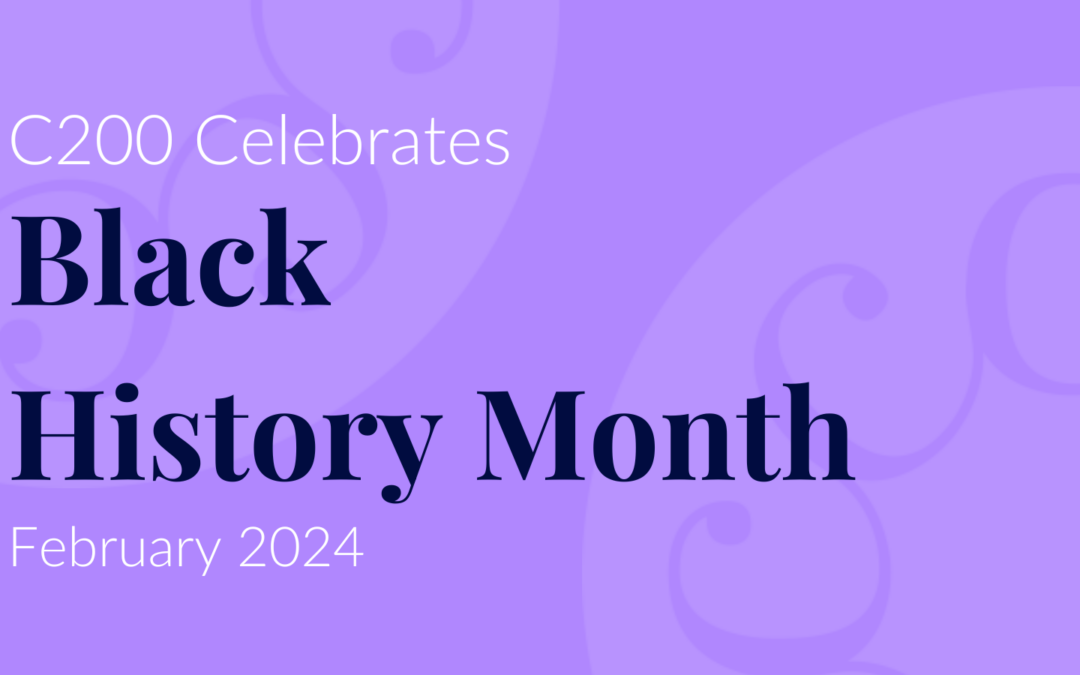
by Eva Glassman | Feb 1, 2024 | Blog, Featured
As we celebrate and acknowledge Black History Month, C200 is committed to taking action to address the long-standing racial inequality in the business world, which affects businesswomen of color the most. The lack of women, especially women of color, in positions of profit and loss (P&L) leadership roles in business is a product of systemic and institutional bias and exclusion. For any odds that women in business have against them, they are exponentially true for women of color—particularly Black women.
This month, C200 will use our platforms to reflect and take action by sharing information and resources that highlight the reality Black women in the workplace, at all levels of business, face daily, so that we can spark important conversations about what it truly means to advance women in business, especially Black women.
We acknowledge that to bring about real progress for women in the business landscape, we must advance all women in that effort. We also acknowledge that this conversation must continue beyond Black History Month, because every businesswoman’s struggle for equality, leadership, and success in the workplace—although each personal and unique—is connected.
Below, please find a non-exhaustive list of studies and reports about women entrepreneurs and corporate executives in the workplace, particularly Black women.

by Eva Glassman | Jan 25, 2024 | Blog, Featured
By Beth Finke, SVP (Retired), Oracle | C200 member since 2023
January marks the beginning of a new chapter, a time when many of us take a pause to reflect on our past accomplishments and set new professional goals. We celebrate a new year infused with opportunities for greater success.
In this recent article for Forbes, C200 Member Beth Boettcher Finke advocates for a shift towards holistic goal setting that goes beyond traditional career metrics. She shares her personal experience in redefining success to consider personal happiness and well-being, fostering a more balanced and well-rounded approach to life.
You can read the full article here.
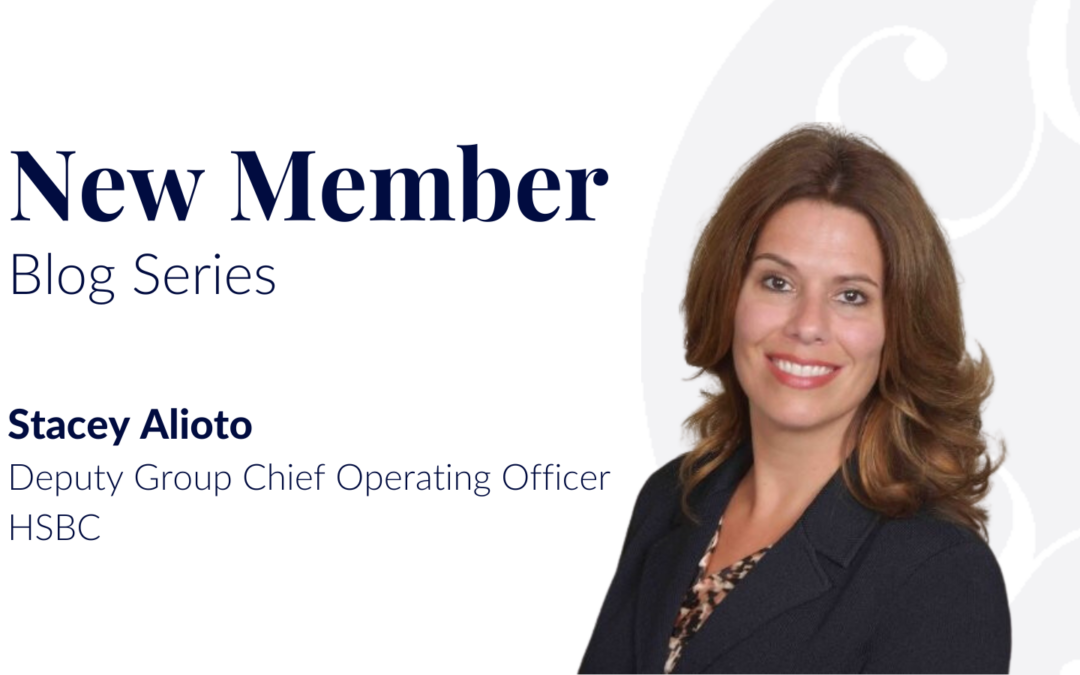
by Eva Glassman | Jan 22, 2024 | Blog, Featured
Stacey Alioto is the Deputy Group Chief Operating Officer of the international bank HSBC. She is responsible for the Bank’s corporate services, chief control office, transformation, and group transactions. She also has COO oversight of Latin America, Canada, and the Middle East, and leads HSBC’s transition to net zero across the Bank’s operations. Stacey has moved 15 times in her life, living everywhere from the US, Italy, Dubai, and Germany to London today. Stacey is passionate about being a mentor for women early on in their careers and building diverse teams. Outside of work, Stacey maintains an active lifestyle and enjoys walks with her family around local parks. Stacey has been a member of C200 since November 2023.
Eva Glassman: You are the Deputy Group Chief Operating Officer of HSBC. What does that mean?
Stacey Alioto: HSBC is one of the world’s largest financial institutions, operating in 62 countries and territories. HSBC is structured by businesses and functions, and I’m in the function called Digital Business Services (DBS) where the operations, technology, transformation, and corporate services teams of the bank sit. What’s exciting about DBS is that we develop innovative digital solutions and deliver excellent services for our customers and colleagues.
As the Deputy Group Chief Operating Officer, I am responsible for our corporate services, transformation, chief control office, and group transactions teams. I also look over our Chief Operating Officers in Latin America, Canada, and the Middle East.
EG: I read that you are also leading HSBC’s initiative to go net zero across the Bank’s operations. What does that look like?
SA: At HSBC, we are committed to net zero in our own operations and supply chain by 2030. That aim incorporates all our offices, data centers, travel, and supply chain. We’ve had a significant program of reducing emissions for quite some time and now we’re starting to look at where we can dial up on renewables. A lot of us personally, as well as professionally, are working to make a difference and move the dial a lot faster.
EG: I want to know more about your career journey. You joined HSBC when they acquired your former workplace, Household International. I also read that you went to University of Nevada, Las Vegas (UNLV)—what did you study? From there, where did you go?
SA: Let me take you back even further than college. My father was in the military and was stationed in Germany when I was 9 months old. My upbringing involved moving around the world quite a bit – so far, I’ve lived in 5 countries and moved 15 times, so I’m comfortable with change, love exploring new cultures, and learning new things. This has served me well working for HSBC as there are many opportunities to work internationally and with people from diverse backgrounds.
I began my career in financial services by pursuing an entry level role in operations at Household International in Nevada. At the time, I was studying business management at University of Nevada-Las Vegas (UNLV); juggling university while being a 19-year-old single mother and working part time wasn’t easy.
My dream of getting into international business came true in 2001 when HSBC acquired Household International; suddenly, I became part of a big international firm. At this stage, I was progressing through supervisor and management roles and went back to UNLV for my MBA in 2004 while continuing working full time.
I then spent the next 10 years progressing through various roles and leadership positions across Transformation, Products, Transactions, and Operations, before moving to Dubai in 2017 to become the COO for HSBC in the Middle East where I was responsible for the COO function across 9 markets. In December 2019, I moved my family to London for my current role.
EG: What do you think were the biggest factors in your success, being able to get to the place in your career that you’re in now?
SA: Having a growth mindset is one of the biggest factors. I always encourage my colleagues to run towards tough projects and tackle problems head on.
Having strong mentorship and support is also super important. It doesn’t come naturally—you have to earn credibility and support as you deliver outcomes.
EG: As you’ve progressed through your career, have you had any female mentors yourself? Are there any other women you find inspiring?
SA: I had a very inspiring female manager who promoted me right before I went on maternity leave with my younger son, which really shocked me. She encouraged high performance and didn’t believe becoming a mother should get in the way of a successful career—that sticks in my mind all the time. Just like she did, I want to help my team get the resources and support they need to be successful both professionally and personally.
Another woman I find inspiring is my mom. Growing up, she was never a runner but in her late 40s she started jogging. She started with a mile or two and progressed to 5ks, 10ks, half-marathons, and marathons. She is now 72 years old and still loves running.
Running a marathon is a bit like facing challenges at work. It’s about breaking them down in such a way that you can deliver the necessary outcomes and achieve the end result, and make sure you’re not sprinting and running out of steam.
EG: What does being a “woman in business” mean to you and how do you apply that thinking to what you do?
SA: I’m passionate about building diverse and inclusive teams. Diverse teams reach outcomes at a much quicker pace and organizations achieve the results they need to achieve because they’re much more open-minded and creative.
I’m really proud of the diversity of my function. Since I inherited the team, we’ve made great progress in becoming more gender balanced and I will continue to push for more diversity and inclusion across the team.
I’m also passionate about being a steward for younger females and mentoring them in their careers. Many are getting married or having their first child but struggle to see how they can have a career, be a wife, and be a mother. I often walk them through my journey and remind them of the resources they have available so they don’t give up too early in their career—I want them to stay confident in their ability to develop their career path.
EG: What is some of the other advice that you give to women in your organization when they want to advance their careers? What are some of the concerns they bring to you?
SA: I’m often asked how confidence is built. For me, it’s about taking risks that give you butterflies in your stomach. When you stretch yourself, you come out on the other side uplifted and more confident.
Moving around also helped build my confidence. When we moved to Dubai, I had to leave before my husband and youngest son to start the visa process, and we left my eldest son back in the US at university; it felt like I was breaking up my family. The first month was difficult, but after a few months I started to get into my new groove and further developed my confidence.
It’s also important to own your career path; don’t wait for somebody to tap on your shoulder. Every year I make my aspirations known, find out what succession plans I’m on, and address my development gaps.
EG: As you said, you’ve moved around a lot of times and lived in a lot of different countries. What is your favorite place you’ve either lived or traveled to? What are some of the things you love to do outside of work?
SA: Everywhere I go, I walk away with something to treasure, a memory, or something to learn. My time in the Middle East taught me the importance of relationships and self-reflection. I can’t say I have a favorite place as they’re all amazing in their own way.
I love being outdoors. I live by one of the large parks in London and love going for a long walk or quick jog–it’s my time to re-energize, reflect, and clear my head. I also enjoy completing the yearly London Marathon Walk–it’s a great way to kick start the year. I think it’s really important that everyone protects some time for their wellbeing and hobbies.
EG: My final question: How and why did you get involved with C200? What are you most excited about as a new member?
A C200 member and fellow HSBC colleague, Lisa McGeough, nominated me. We crossed paths around two years ago and connected right away. We both have a growth mindset and have found some amazing opportunities to work together and improve alignment across the organization.
C200’s mission to support women in business really resonates with me. I’m passionate about how I can support the future generation of female leaders with C200’s Reachout Program for university-age women. I’m also excited about helping to extend C200’s reach across the globe; Lisa and I have already brainstormed some ways we can help grow C200 internationally!
I love the opportunity C200 gives me to expand my network and learn from the amazing women who are part of it.
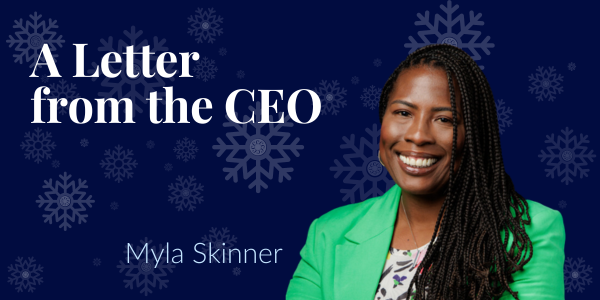
by Eva Glassman | Dec 19, 2023 | Blog, Featured
Dear C200 Community,
Several months ago, at the start of my role as CEO, I asked a long-term member why she joined and has stayed a member of C200 all this time. Her answer was a simple one: “These are my people.”
C200’s community, while our members are at its center, is larger than just our members: our members’ loved ones, Advancing Women Program participants and facilitators, event speakers, and even social media followers are all a part of our wider community. It’s all of you, a group of individuals who believe in our mission to advance all women in business, who are able to make C200’s offerings to current and future women entrepreneurs and corporate leaders possible. Below is just a small list of the many things we’ve accomplished in 2023:
- We held our first-ever Empowering Women Summit in Atlanta, GA
- We reimagined and relaunched the Protégé Program
- We hosted a Reachout in partnership with Agnes Scott College and Georgia State University
- We hosted an incredible Annual Conference in San Diego, CA
- We revitalized our communications to better align with our focus on #SuccessShared
- We engaged with hundreds of community members through in-person and virtual events
- We built an incredible C200 team who works tirelessly to advance our mission
Of course, we still have a lot to do—2024 will be an exciting year for C200. In addition to ensuring that we provide the best experience for our members, we will continue to focus on developing premier educational programs for the next generation of women entrepreneurs and executives, as well as redesign our model for high-impact experiences and programs for members and non-members alike. Additionally, we are thrilled to host:
- Our Empowering Women Summit in Washington, D.C. from April 18-20
- Our Annual Conference in New York City from September 26-28
- Many more events and programs to be announced
In 2024, building up and supporting this wonderful community will be at the core of everything we do, all while shining a light on why everyone, members and non-members alike, should continue to care about our mission to inspire, educate, support, and advance current and future female entrepreneurs and corporate, profit-center leaders.
I, with our C200 team, love to see you engaging with C200 and our cause, whether that be through attending one of our Signature Events like our Empowering Women Summit or Annual Conference, sharing your C200 stories, donating to C200, or simply giving us a like or reshare on LinkedIn or Instagram. Your involvement with C200, however big or small, extends the reach of our community and mission, and we hope you follow us into the new year and beyond.
We are thankful to be an organization that matters to you. I hope to see you at our upcoming events in 2024.
-Myla Skinner
CEO

